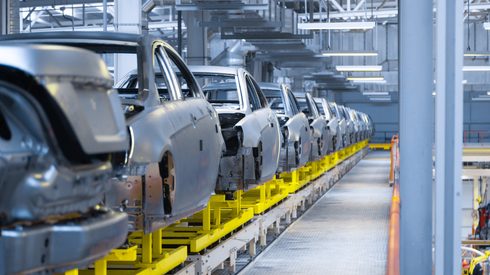The investment in nuclear energy is important, the CEO explained, because “an effective electric grid requires both baseload and intermittent power sources, which is why we believe that both nuclear and renewable energy must be a part of the solution to achieve carbon reductions while maintaining grid reliability.”
The company this month announced a $15-million investment in NuScale, “a leading developer of new nuclear power technology called the small modular reactor,” according to Topalian. “This investment in NuScale complements [various other] efforts to help the United States develop new sources of clean power. We have supported the development of solar and wind energy projects by signing three power purchase agreements for roughly 600 megawatts of renewable power generation capacity,” he said.
Setting new targets
“While our greenhouse gas emissions are just one-fourth of the global average for the steel industry, we continue to look for ways to further reduce our emissions,” Topalian continued.
According to a presentation released on April 21, Nucor’s carbon intensity in 2020 was “nearly 50% below the most aggressive Paris Climate Agreement GHG reduction targets for our sector and more than 75% below the GHG intensity of most integrated steelmakers.”
For steelmakers, a carbon intensity score measures the tonnes of carbon dioxide (CO2) emitted per tonne of steel produced. The assessment cited by Topalian was conducted by the London-based Transition Pathway Initiative (TPI) using data sourced from the World Steel Association.
“We are a completely independent company and not hired by the companies we assess,” Antonina Scheer, a carbon researcher at TPI, told Fastmarkets on Tuesday April 26.
In 2020, Nucor’s carbon intensity score stood at 0.47 tonnes of CO2 per tonne of steel, while the global steel industry had a score of 1.72, according to TPI.
A year ago, Nucor aimed to reduce its carbon intensity score to 0.39 in 2030, Scheer said.
In its presentation, the steelmaker reported that in 2021 it had already achieved a lower 0.43 carbon intensity rating – its original target for 2025 – and reduced its Scope 1 and Scope 2 emissions by 9%. Scope 1 represents direct greenhouse gas emissions, while Scope 2 refers to indirect emissions from providers of electricity, steam, heating and cooling.
Topalian also noted the company last month received the General Motors Overdrive Award for Supplier of the Year for its partnership with GM to produce low-carbon Econiq steel for automotive applications. Nucor has won the automaker’s Overdrive Award four years in a row and remains the only electric-arc furnace steelmaker to receive it, the CEO said.
“These awards also demonstrate the benefits of investments we are making to serve our automotive and other customers with demanding applications for lower-carbon dioxide-intensity steel,” Topalian said.
Editor’s Note: This story was updated on Wednesday, April 27 to correct the definition of carbon intensity score. The original version incorrectly said it is a measure of the volume of carbon dioxide emitted per tonne of steel produced when it is in fact a measure of the weight in tonnes of carbon dioxide emitted per tonne of steel produced.






